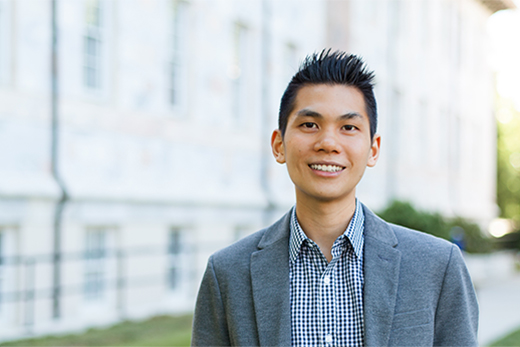Growing up in the multicultural city of Berkeley, California, Accelerated BSN student Mark Lee learned early on that socioeconomic status weighs heavily on how healthy you are and how long you live.
Eager to address cross-cultural disparities in health, Lee’s interest in global health led him to earn a BA in International Development from UCLA and an MS degree in Global Health from Georgetown University before coming to the Nell Hodgson Woodruff School of Nursing. While a student at Georgetown, Lee became involved with research in Chiapas, Mexico through a longstanding partnership between the Georgetown Department of International Health and El Colegio de la Frontera Sur (ECOSUR), a public scientific research institute. While there, Lee worked with the ECOSUR Department of Health to conduct research on the relationship between undernutrition in early childhood and its potential impact on overweight and obesity later in life. Lee’s research in Chiapas would end up earning him the 2017-2018 Exceptional Masters Student Award in Science from Georgetown, an award recognizing a graduate student who demonstrates a high level of proficiency in the sciences, incorporating academic achievement, quality of research and commitment to advancing studies through work experience.
His 10-week-long field research module and scholarly project focused on nutritional issues among child and adolescent populations in this region of southern Mexico. Lee says that southern Mexico now faces both extremes of malnutrition: chronic undernutrition, especially in children under five years of age, alongside quickly rising rates of overweight and obesity in adolescents and adults. The paradox that a child undernourished in early life may be at higher risk for overweight and obesity in later life formed the basis of Lee’s research and collaboration with ECOSUR.
“My project with ECOSUR looked at how nutritional deficits accumulated in early life related to the temperamental qualities of the children presented in later life as adolescents,” says Lee, adding that there is a relationship between issues of temperament as risk factors for overweight and obesity in these age demographics.
While in Chiapas, Lee went into the field with ECOSUR to interview study participants and collected the data one might expect from a study of this kind. He noted gender, age, level of education, employment status, profession, quality of the diet and other factors common in global health research such as the composition of the household roofing and walls, as well as household access to electricity, piped water and kitchen appliances. Lee also looked into the size and proportions of study participants’ physical bodies. But, beyond the rather sterile task of collecting data, something unexpected happened. The humanity of those participating in the study became very real and left a lasting impression on Lee.
“Going into the field and interviewing the participants and collecting data, I noticed that those who came from the poorest backgrounds were always the most generous with their time and that really struck me as important and a population that I would like to do better for,” says Lee.
While at Georgetown, Lee worked at the United Nations World Food Programme as a junior consultant. This program serves as the agency which provides food assistance in humanitarian emergencies and in developing countries. Lee took cross-disciplinary course work at the School of Foreign Service and the O’Neill Institute for Global Health Law at Georgetown. He learned that it takes cooperation across multiple professions to adequately address public health issues around the world.
Now a nursing student, Lee says he chose the Nell Hodgson Woodruff School of Nursing at Emory University because of the school’s unique commitment to social responsibility. He says students have abundant opportunities to address health disparities near and far, from volunteering with groups such as the Center for Black Women’s Wellness in Atlanta, to service learning trips offered through the Lillian Carter Center for Global Health & Social Responsibility. It’s this brand of vibrant, global nursing education that Lee says will strengthen his post-graduation future.
“In the long-term I hope to be working at the nexus of nursing and public health, working at patient and population levels to improve the health status of those in need,” says Lee.

